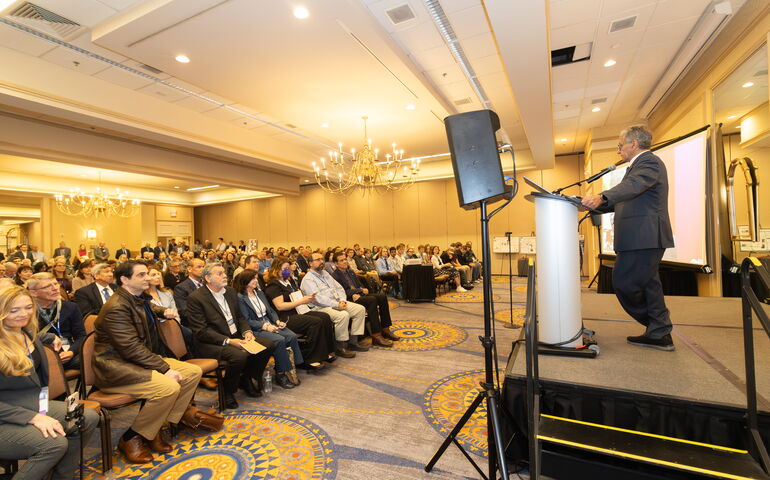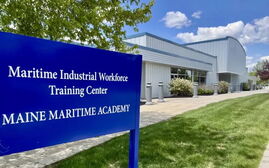Planning is underway for a second Maine Space Conference
 Courtesy / Soubanh Phanthay, Maine Space Grant Consortium
Terry Shehata, executive director of the Maine Space Grant Consortium, addressed the audience at the inaugural Maine Space Conference in November 2023 in Portland.
Courtesy / Soubanh Phanthay, Maine Space Grant Consortium
Terry Shehata, executive director of the Maine Space Grant Consortium, addressed the audience at the inaugural Maine Space Conference in November 2023 in Portland.
After selling out tickets for its inaugural Maine Space Conference last November, the Maine Space Grant Consortium and its partners have plans underway for the second such event.
The second Maine Space Conference is scheduled for Oct. 23-25 at the Holiday Inn by the Bay in Portland.
“Maine has an incredibly bright future ahead, but we must seize on the momentum we are building to boldly advance our cause,” said Terry Shehata, the consortium’s executive director.
Last year’s three-day conference drew more than 320 people and key industry players, including NASA Associate Administrator Michael Kincaid, NASA space architect Taylor Phillips-Hungerford; and top executives from RAND Corp., Teledyne Technologies Inc., Foundation for the Future, Rogue Space Systems and the Manufacturers Association of Maine.
The event was followed by an announcement from Teledyne Technologies Inc. (NYSE: TDY) that it planned to open an office at Brunswick Landing.
At the time, Jack Mills, head of sales and business development in the Americas for Teledyne's space imaging unit, told Mainebiz that the Thousand Oaks, Calif.-based tech company was attracted to the opportunity to support development of an innovation hub for the space market.
For 2024, Shehata said conference organizers will hone their focus on deepening relations with key industry partners, government, educators and the investment community from inside and outside of Maine.
The conference is being positioned as an invitation for the global space community to engage with Maine's rapidly growing space economy and to learn about the state’s manufacturing and workforce capabilities.
“Maine has a gleaming opportunity to enter the NewSpace economy and to seize the incredible benefits at a statewide level,” said Shehata.
The conference will offer 18 sessions over three days covering a range of topics, including investment and finance; sustainability and infrastructure; education and workforce development; research and data; national security; and Maine’s emergent aerospace industry.
In addition to highlighting major space-related activities that have implications in Maine, the conference will showcase space-related activities already underway at Loring Commerce Centre, at Brunswick Landing and within Maine colleges, universities and other schools.
Showcasing the state
Shehata noted that organizers expect to build on last year’s 18 sponsors, which included Spirit AeroSystems, Teledyne E2V, the Portland law firm Verrill, Bangor Savings Bank, N2K Space, Space Watch Global, the University of Maine, the Institute of Electrical and Electronics Engineers and SHL Enterprise Solutions.
“Last year we showcased the state’s capacity to develop next-generation resources for high-growth data-rich industries,” said Shehata. “This year, we hope to further Maine’s conviction for becoming a national space player.”
Maine has more than 85 aerospace companies with operations here, along with advanced materials facilities and a polar orbit geographical advantage, which Shehata said makes Maine well situated as a hub for the NewSpace industry, particularly as it relates to small rocket and nanosatellite markets.
To succeed, he said, Maine must recruit more space-related businesses; build upon the research and development and educational capabilities in the state’s institutions of higher education; and build a pipeline of students and workers.
“Maine is at a critical crossroads,” said Shehata. “Our pathway to space leads through our schools and universities, our entrepreneurs and business leaders, and through the funders and believers who can envision Maine as a NewSpace leader.”
The Maine Space Complex consists of three core business units envisioned as spanning several geographic locations around the state.
In order of priority, the units include a space data and advanced analytics center, which could be located anywhere in Maine due to its virtual nature; a new space innovation hub, which would be located at Brunswick Landing with a spoke at Loring Commerce Centre; and a launch sites and services unit, which would consist of staging areas and vertical and horizontal launch sites for sending small satellites into polar orbit from Brunswick Landing, Loring Commerce Centre and Washington County.
The nonprofit Maine Space Grant Consortium is a member of the national network of consortia in all 50 states plus Puerto Rico and the District of Columbia. The network is funded by NASA’s National Space Grant College and Fellowship Program. The Space Grant program was established by Congress in 1988 to contribute to the nation’s science and engineering enterprise.
The Maine Space Corp. was created by the Maine Legislature as a quasi-independent state entity to establish the Maine Space Complex by leveraging the state's geographic, rocketry, manufacturing and higher education assets and capabilities.
Maine Space 2030 is a public awareness campaign designed to raise awareness of Maine’s research.
Call for entries
Organizers of the next Maine Space Conference have issued a call for speakers, sponsors and exhibitors. Those interested in presenting are invited to submit content proposals between now and April 5.
Attendee registration is scheduled to open in May. For more information, click here.














0 Comments